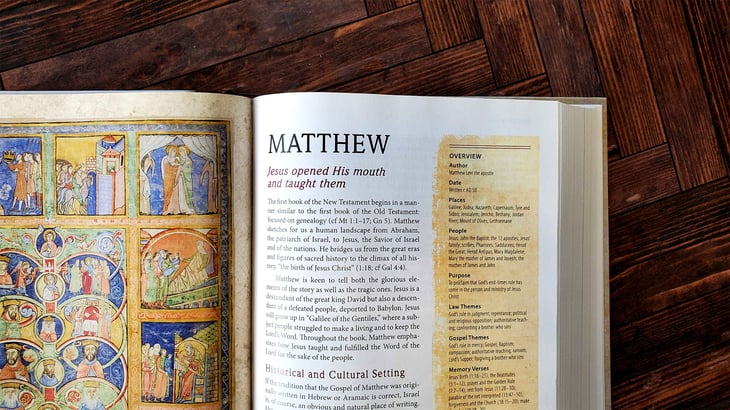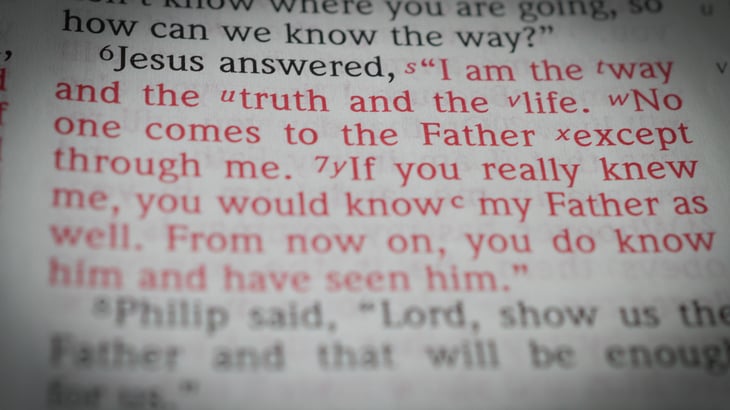Digging Deeper into Scripture: Matthew 2
Some of the most well-educated people in the world are not Christians. In fact, some of the best minds on the subject of Christianity are not Christians. How can this be? A talented mind can grasp the breadth and depth of Christianity’s history, literature, customs, languages, and even theology without ever truly knowing Christ as the believer does. Many Lutheran pastors, myself included, draw upon expertly researched books and articles written by intelligent, well-trained unbelievers. This is possible because there is a sharp distinction between understanding Christianity and trusting in Jesus Christ as Lord and Savior.
Digging Deeper into Scripture: Luke 7:18–28
Visiting the homebound, the hospitalized, those living in nursing homes, and the imprisoned is a privilege and a joy. Those in such circumstances are welcoming and happy to receive visitors. One of the challenges for them is dealing with isolation. Even with radio, television, and social media, it is easy to become out of touch with what is happening in the world if you can’t be part of it. Such was the case for John the Baptist.
Digging Deeper into Scripture: Mark 13:1–13
As I am writing this blog, Christmas is still two months away. However, there are already signs of its coming. Recently, I did some shopping. Halloween has yet to pass and there are already Christmas items on the shelves. I love this time of year, not only because of the weather in Indiana but also because there is a wonderful succession of holidays leading to the celebration of Christmas. These holidays are signs leading to the birth of our Lord. The church has signs of its own. The weeks of Advent bring Scripture readings related to Jesus’ birth, and we light a new candle each week.
The Gospel Accounts: An Overview
Jesus Christ brought the Gospel (from older English, “Good-spel,” “good news”) to the world. He announced that in His person the kingdom of God was coming to mankind and that through faith in Him people might find new and eternal life. He was Himself the Good News, or Gospel.
The Gospel of John: An Overview
The plain bows into the Sea of Galilee where families of fishers settled and built their homes. The villagers prospered and, with the help of a centurion, built a synagogue. The settlement became known as Capernaum, “Village of Comfort” or perhaps “Village of Nahum,” though there is no clear association with the Old Testament prophet by that name. Since the settlers built no wall to defend themselves, their lives must have been peaceful until the teacher from Nazareth arrived.
The Gospel of Luke: An Overview
The Jerusalem temple was overlaid with so much gold that persons who saw it described its blinding effects as it glistened in the sun. Herod the Great refurbished it. He surrounded it with a massive court, turning the Temple Mount into a sacred complex far larger than other temples of the ancient world. The project was ongoing when Mary and Joseph brought the infant Jesus to the temple for purification (Luke 2:22–38). It was still going some 30 years later when Jesus cleansed the temple from the money-changers at the beginning of Holy Week. During those days, Jesus would prophesy the temple’s destruction and His own resurrection.
This blog post is adapted from Lutheran Bible Companion, Volume 2: Intertestamental Era, New Testament, and Bible Dictionary.
The Gospel of Mark: An Overview
Forty-one times Mark describes the events flowing around Jesus’ life with the word immediately (in Greek, euthus), propelling the reader toward the cross where Jesus would die, giving His life as a ransom for many. Mark uniquely focuses on the action in the story of Jesus’ life, making his account both short and compelling to read.
This blog post is adapted from Lutheran Bible Companion, Volume 2: Intertestamental Era, New Testament, and Bible Dictionary.
The Gospel of Matthew: An Overview
The first book of the New Testament begins in a manner similar to the first book of the Old Testament: focused on genealogy (cf Matthew 1:1–17; Genesis 5). Matthew sketches for us a human landscape from Abraham, the patriarch of Israel, to Jesus, the Savior of Israel and of the nations. Matthew is keen to tell both the glorious elements of the story as well as the tragic ones. Throughout the book, Matthew emphasizes how Jesus taught and fulfilled the Word of the Lord for the sake of the people.
This blog post is adapted from Lutheran Bible Companion Volume 2: Intertestamental Era, New Testament,and Bible Dictionary.
Digging Deeper into Scripture: Matthew 9:9–28
A quote attributed to Benjamin Franklin regarding taxes is “In this world nothing can be said to be certain, except death and taxes.” I have yet to encounter anyone who is pleased to pay taxes. What is more, were one to survey every taxpayer in the United States, such an effort would produce an endless variety of opinions on how much taxation is appropriate and what are legitimate uses of tax dollars. Matthew, a tax collector, lived under the disdain of those from whom he collected taxes.
Digging Deeper into Scripture: John 14:1–14
Having just passed my fiftieth birthday, I am well into adulthood. I noticed several years ago that I not only look but also behave like my father. My hands are an excellent example. The shape of my fingers resembles his, as do my fingernails and wrinkles. Even more interesting is that when driving, I place my hands on the steering wheel in the same places he did. This happened naturally since he was deceased before I learned to drive. There are a myriad of other examples in both appearance and behavior. The point is that beyond my birth certificate, there is evidence that I am my father’s son.




















